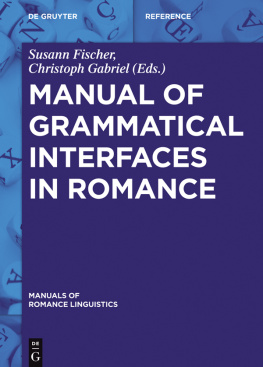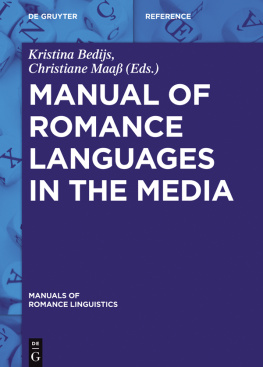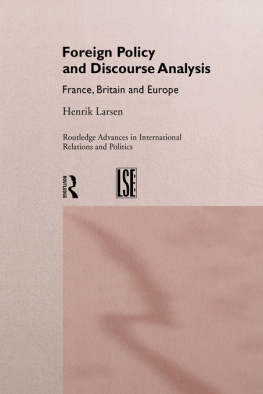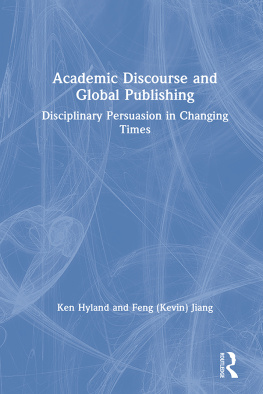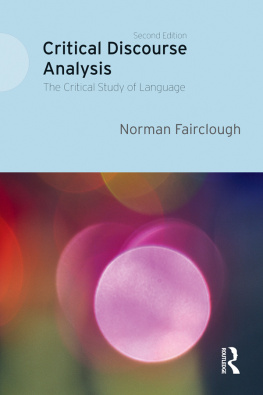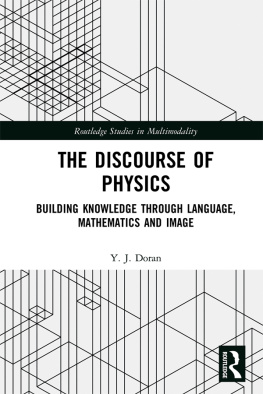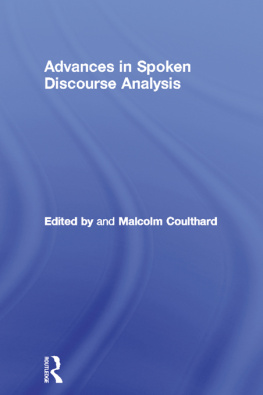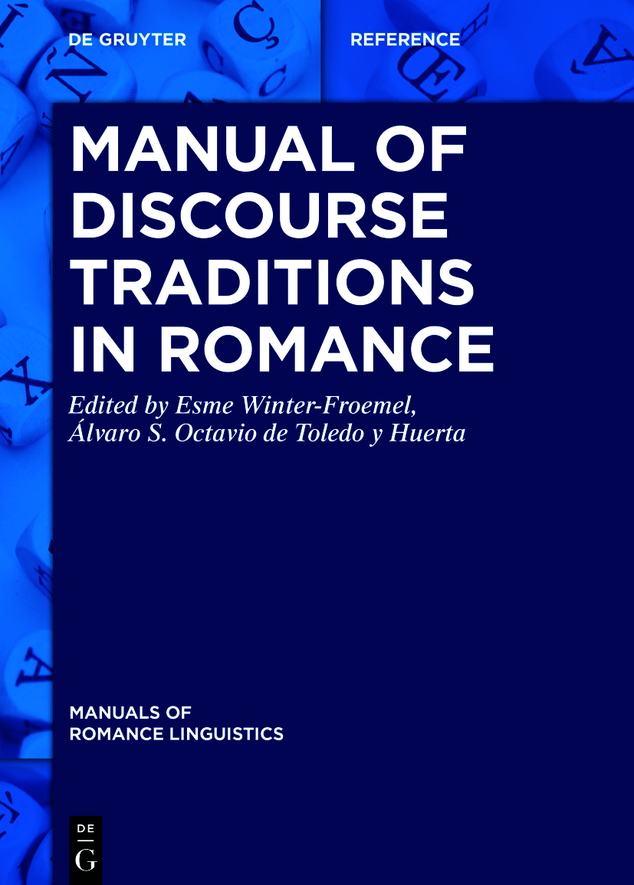Keywords: discourse traditional knowledge, discourse traditions, historical linguistics, history of discourse traditions, history of Romance, interdisciplinary perspectives, textual science, theory of discourse traditions,
Discourse traditions: an insufficiently exhausted key approach to discourse and historical linguistics
Discourse traditions (henceforth DTs) can be seen as a defining model of contemporary Romance studies, particularly in the field of linguistic variation and change. At the same time, it needs to be acknowledged that the concept of DTs has been received so far mainly in German-speaking Romance Linguistics and in Hispanic and Portuguese studies worldwide, while the approach and the possibilities it offers have gone barely noticed in international linguistic research. The model competes here with other, more strongly established approaches, such as corpus linguistics, text linguistics or discourse analysis, which deal with the textual conditions of language production and language change. There is thus a variety of approaches that focus on discourse phenomena from different perspectives and emphasise the importance of the discursive level within a comprehensively conceived linguistics, but the task remains to specify the contributions of these approaches to the investigation of issues in the field of DTs proper. Moreover, even within the research on DTs, central theoretical questions are still controversial (cf. 1 Discourse traditions research: foundations, theoretical issues and implications). This can be in part explained by the fact that so far only individual essays and case studies on specific phenomena of change for individual languages are available, but no widely accepted handbook exists that displays the basic notions, applications and relations to other approaches in an in-depth and comprehensive manner. The visibility and application possibilities of the DT model have thus been insufficiently exhausted due to lack of systematisation.
The present volume aims to fill this gap and respond to the research desiderata in order to open up new perspectives for DT research. By bringing together chapters from Romanists who have significantly contributed to shaping the notion of DTs in recent years, as well as from international scholars working on related topics and approaches in the field of historical discourse linguistics and textual studies, our manual aims to diffuse and establish the DT model at an international level. The volume includes theoretical overviews and case studies, and it contains both chapters on classical issues of DT research and others rooted in other frameworks and traditions, whose authors were invited to contribute to this volume their reflections on possible applications and contacts with neigbouring disciplines.
Structure of the present volume and overview of the contributions
The volume is organised into four main parts. These parts focus on different aspects of the concept of DTs that we consider equally relevant and complementary. In addition to contributions that provide overviews of previous research on the concept, we have deliberately reserved a considerable part of the volume to studies that open up hitherto unexplored perspectives for further research. We thus hope to contribute to push research on DTs to the next level.
Part I focuses on The theory and history of discourse traditions and discourse traditional knowledge, assembling contributions on classical issues that have been discussed in Romance linguistics with respect to the notion of DTs and its relations to other major concepts of (Romance) linguistics. The contributions explain the epistemological foundations and implications of the DT model, and thereby locate previous research on DTs with respect to major domains of application and points of discussion. At the same time, the contributions of Part I also contain various proposals to further elaborate the concept of DT research by introducing additional distinctions and establishing links to other theoretical frameworks.
The predominantly theoretical focus is continued in the contributions of Part II, investigating Discourse traditions within historical linguistics and textual linguistics: models, concepts, and approaches. This part of the volume highlights major domains where the concept has been successfully applied to refine previous descriptions and analyses. Moreover, in addition to contributions from the realm of DTs proper, this part of the manual integrates chapters that discuss alternative approaches in the fields of text analysis and language change. By investigating areas of overlap and connections between the different approaches, new paths to be explored in further research are suggested.
Contrarily to the strong theoretical orientation of the first two parts of the volume, Part III, on Discourse traditions in the history of Romance: applications and case studies, adopts a historical focus, offering contributions on the development of the Romance languages and varieties from the perspective of DTs. A first set of contributions focuses on the earliest periods in the history of Romance, where convergent evolutions can be observed. The special focus on the early periods of language history and on the relations between Romance and Latin also reflects the special attention that has been devoted to these issues in previous research. This first set of contributions is then complemented by further contributions that focus on individual languages or varieties, providing overviews that display the relevance of DTs in their history, or case studies on particular historical settings. The contributions of Part III thus illustrate how the notion of DT can serve to analyse singular phenomena and evolutions in a precise and fine-grained way.
Finally, Part IV Contacts with further approaches aims to show possibilities of future applications and connections of the concept of DTs to further phenomena and approaches.
The complementarity of the diverse perspectives and approaches taken with respect to the notion of DTs is also reflected at the level of the individual contributions. The first contribution of Part I on Discourse traditions research: foundations, theoretical issues and implications (Chapter 1), provides an overview of key issues that have been controversially debated in DT research since the introduction of this concept, including the notion of DTs itself as well as related concepts and distinctions (historicity, the historical and the individual level,


